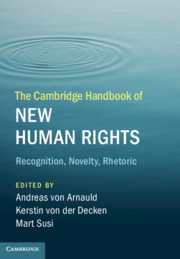Book contents
- The Cambridge Handbook of New Human Rights
- The Cambridge Handbook of New Human Rights
- Copyright page
- Contents
- Figures
- Contributors
- Acknowledgements
- Introduction
- Part I Cross-Cutting Observations
- Part II Public Good Rights
- The Right to Water
- 4 Access to Water as a New Right in International, Regional and Comparative Constitutional Law
- 5 Something Old, Something New, Something Borrowed and Something Blue
- Rights to Housing and to Land
- The Right to Health
- The Right to a Clean Environment and Rights of the Environment
- Part III Status Rights
- Part IV New Technology Rights
- Part V Autonomy and Integrity Rights
- Part VI Governance Rights
- Index
4 - Access to Water as a New Right in International, Regional and Comparative Constitutional Law
from The Right to Water
Published online by Cambridge University Press: 04 January 2020
- The Cambridge Handbook of New Human Rights
- The Cambridge Handbook of New Human Rights
- Copyright page
- Contents
- Figures
- Contributors
- Acknowledgements
- Introduction
- Part I Cross-Cutting Observations
- Part II Public Good Rights
- The Right to Water
- 4 Access to Water as a New Right in International, Regional and Comparative Constitutional Law
- 5 Something Old, Something New, Something Borrowed and Something Blue
- Rights to Housing and to Land
- The Right to Health
- The Right to a Clean Environment and Rights of the Environment
- Part III Status Rights
- Part IV New Technology Rights
- Part V Autonomy and Integrity Rights
- Part VI Governance Rights
- Index
Summary
Water, like the air we breathe, is a life-sustaining resource that we cannot live without. It also happens to be a common heritage of all mankind which past generations preserved, used and passed what remained on to the current generation, which must in turn manage and use it sustainably for onward transmission to future generations. It should therefore be uncontroversial to say that everyone has a right of access to water – but it is not. Can one say that access to water is now recognised as a new right in international law and a constitutional right in comparative domestic law? Why should one ask this question in the first place? Are there arguments against the recognition of the right to water? Do these arguments have any merit? This chapter seeks to address these pressing questions in the context of the current state of international and comparative law. The ultimate purpose is to find out whether there is a trend towards the recognition of access to water as a new right in international and comparative constitutional law, and if so, how such a trend is manifested.
- Type
- Chapter
- Information
- The Cambridge Handbook of New Human RightsRecognition, Novelty, Rhetoric, pp. 55 - 69Publisher: Cambridge University PressPrint publication year: 2020



